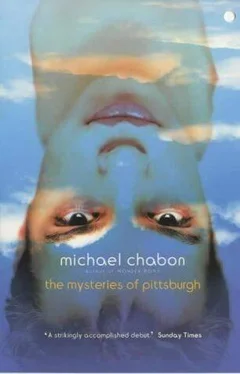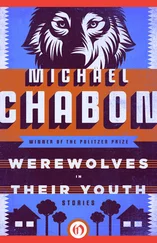Michael Chabon - The Mysteries Of Pittsburgh
Здесь есть возможность читать онлайн «Michael Chabon - The Mysteries Of Pittsburgh» весь текст электронной книги совершенно бесплатно (целиком полную версию без сокращений). В некоторых случаях можно слушать аудио, скачать через торрент в формате fb2 и присутствует краткое содержание. Жанр: Современная проза, на английском языке. Описание произведения, (предисловие) а так же отзывы посетителей доступны на портале библиотеки ЛибКат.
- Название:The Mysteries Of Pittsburgh
- Автор:
- Жанр:
- Год:неизвестен
- ISBN:нет данных
- Рейтинг книги:5 / 5. Голосов: 1
-
Избранное:Добавить в избранное
- Отзывы:
-
Ваша оценка:
- 100
- 1
- 2
- 3
- 4
- 5
The Mysteries Of Pittsburgh: краткое содержание, описание и аннотация
Предлагаем к чтению аннотацию, описание, краткое содержание или предисловие (зависит от того, что написал сам автор книги «The Mysteries Of Pittsburgh»). Если вы не нашли необходимую информацию о книге — напишите в комментариях, мы постараемся отыскать её.
The Mysteries Of Pittsburgh — читать онлайн бесплатно полную книгу (весь текст) целиком
Ниже представлен текст книги, разбитый по страницам. Система сохранения места последней прочитанной страницы, позволяет с удобством читать онлайн бесплатно книгу «The Mysteries Of Pittsburgh», без необходимости каждый раз заново искать на чём Вы остановились. Поставьте закладку, и сможете в любой момент перейти на страницу, на которой закончили чтение.
Интервал:
Закладка:
"Who owns this place?" I said, unscrewing my head from the helmet as we climbed off the bike.
"No one knows."
"Ah."
"Every month, on the first night of the full moon, I leave the rent money in a little paper bag at the end of the driveway. In the morning it's gone."
We climbed the steps of the house and crossed the creaking porch, went through the living room. Paperback books were piled everywhere, on tables, on the floor, in corners, and I glanced at their titles, an eclectic assortment that ran from the true stories of famous murders to Knut Hamsun, from diet books and horoscopes to Vonnegut and comic books. I supposed that all this odd variety represented the many and multiform roommates and previous occupants of the Casa del Fear.
"Have you read all of these?"
"Of course. Why else would they be here?"
"You bought all these books?"
"I don't buy books," he said.
This was before I knew about Cleveland 's magical coat of many pockets, which inexhaustibly brought forth cigarettes, canned goods, books and magazines, and the occasional rubber snake or chattering wind-up dentures plucked from a variety store. Perhaps the greatest single miracle that Cleveland ever performed was to have run through his mother's considerable legacy in six years without ever purchasing anything more expensive than his motorcycle.
We cleaned ourselves up, and while he changed I wandered the halls, looking into the bare rooms, each with a stereo and a mattress. None of the evil roommates appeared to be home, although traces of them, visual and olfactory, were everywhere. Some of the bedroom doors were padlocked, others were torn from their hinges and set tilted against a wall. I stepped into one room and stared absently for a few moments at a poster that promoted a rock-and-roll band, before noticing that it depicted a garish Aztec sacrifice atop a pyramid-the heart, bereft of its body, lovingly rendered. I was thinking that I had to call Phlox, and the thought of Phlox was so appealing that I almost decided just to go to her, to sneak out of the house and let Cleveland head downtown alone. Perhaps that would have been an even more foolish thing to do, although it is difficult to see how. In any case, he stuck his head in the door.
"Okay, Bechstein."
I turned. He had on round white-rimmed glasses that made him look rather fey.
"All right." I sighed. "Just let me call Phlox."
But there was no answer; so we went downtown, which was my fourth time on the back of Cleveland 's motorcycle.
17. B and E
On the way downtown, I considered the possibility that I might end up once again in the ill-starred Italian restaurant. It would have made, at least, for a kind of gruesome symmetry. But my father, as it happened, was in his hotel room, with several other men. Dimly we could hear them laughing as we came down the worn plush in the cool, faded hotel corridor. My cheeks tingled from exercise and anxiety. And then Cleveland astonished me: When I stopped at the numbered door and for a last look of encouragement turned to face him, he drew a necktie from the pocket of his leather jacket and began to loop it around his shirt collar. The tie was gray-brown, with an intricate pattern of unusual squares and ovals.
"Rattlesnake," said Cleveland.
Another round of guffaws from the other side of the door. I waited, so as not to cause an ominous, abrupt cessation of laughter; when I heard the final sound of my father clearing his throat, I knocked. After the several seconds that it took them silently to discuss and to delegate, a man opened the door, one of Them. I tried to look into the room, but there was a white vestibule-a bench, a mirror, and a gladiola in a vase-and nothing else. The man, in shirtsleeves and suit pants, had a pale face and an uncool haircut. He recognized me, and I wondered how many times I had seen him before. He smiled and stepped out into the hall, shutting the door behind him.
"Hey," he said. "How do you like that? It's Joe Bech-stein's boy." He shook my hand. "Jimmy. Jim Breezy. Last time I saw you, you were a kid. Say, Art, listen." He put his hand on my shoulder and pulled me a little toward him, and a little away from the door, then he looked over my shoulder and seemed to notice Cleveland for the first time. "This a friend?"
"Yes; right. It is good to see you, Jimmy."
"Say, Art, listen-your dad's kind of busy right now, you know, he's talking to some people. So. He's busy."
"Oh, no."
"Yeah, you know? I think maybe you better come back in an hour, like an hour and a half, maybe."
"Oh. Okay, Jimmy, sure. Five o'clock, say?"
He said sure, without looking at his watch, and went back in; the door shut.
"Oh, well," I said, "five o'clock. My dad's busy."
Cleveland rolled his eyes.
"You're jelly, Bechstein, you're like fish jelly," he said, and knocked on the door.
"Yeah?" Jimmy Breezy said this time, still smiling.
"Couldn't we see Mr. Bechstein now, and not at five o'clock?" said Cleveland.
"Who are you?" said Jim, smileless now.
"I'm the friend. Cleveland Arning."
"Send them in," I heard my father say.
Jim Breezy swung out of our way, like a gate.
There were seven men in the room, not counting Them, sitting in a variety of armchairs around a long, low coffee table, on which lay a read and refolded newspaper, a key, and my father's airplane ticket: my father, dressed for golf and looking hard but relaxed; Uncle Lenny, also in white shoes and big pastel pants; and five other men, one of whom, also pale-faced, sat bolt upright when he saw Cleveland. He had to be Frankie Breezy, a bit surprised to find his motorcyclist employee in the same hotel room as he. Frankie was a frail-looking man who wanted you to know, I saw at once, that he had a lot of money invested in his clothes. He was the flashiest thing in the room, which was, like the whole hotel, old, stale, elegant, and large. The men were enjoying their long cigars and their drinks; my father and Lenny had the usual glasses of iced coffee, all the other men something ginger or clear with a twist; and everyone had his smile on, with the exception of Frankie Breezy.
"Hello, Dad; hello, Uncle Lenny," I said, deciding against going over to kiss my father's cheek. I nodded to the other men, who nodded to me. "I'm sorry to bother you. And this is my friend Cleveland."
My father rose toward me, and he gave me a kiss. He shook hands with Cleveland.
"Joe, I know Cleveland," Frankie said, in an intentionally very strange tone of voice. My father looked at me.
"I'm very glad to meet you, Mr. Bechstein," said Cleveland. "And it's really all my fault that we're interrupting you this way. I wanted to meet you."
"Glad to meet you," said my father quietly.
"He's one of mine," Frankie said.
"Why don't you and Cleveland amuse yourselves downtown for a couple of hours, Art. Then I'll take you both to dinner." He did not blink.
"Yeah, some of us ain't got a summer vacation, Art," said giggling old Lenny. "Some of us have to work even on the hottest day of the summer."
"All right, fellows. I'm busy. Good-bye."
"Aw, Joe, let them stay a minute," said one man, an older, balding once-blond man with friendly water-blue eyes and a nose destroyed by boxing. He picked up the newspaper and laid it beside him. This was Carl "Poon" Punicki, although I didn't know it at the time. Three other things I did not know then about him were, first, that he was a big-time jewel fence; second, that he and Frankie Breezy had been feuding all year over a small piece of the Monongahela Valley; and third, that he had a son, whom he prized and ate dinner with every Sunday afternoon, who was a biker. "I never met your boy, Joe."
My father had been required to do business with this man; he turned and put his arm around me.
Читать дальшеИнтервал:
Закладка:
Похожие книги на «The Mysteries Of Pittsburgh»
Представляем Вашему вниманию похожие книги на «The Mysteries Of Pittsburgh» списком для выбора. Мы отобрали схожую по названию и смыслу литературу в надежде предоставить читателям больше вариантов отыскать новые, интересные, ещё непрочитанные произведения.
Обсуждение, отзывы о книге «The Mysteries Of Pittsburgh» и просто собственные мнения читателей. Оставьте ваши комментарии, напишите, что Вы думаете о произведении, его смысле или главных героях. Укажите что конкретно понравилось, а что нет, и почему Вы так считаете.












